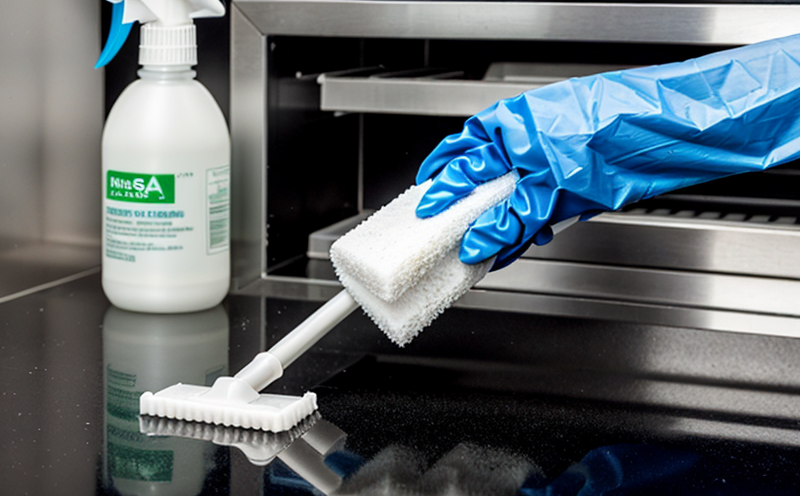DIN EN 14563 Virucidal Testing of Hygiene Plastics
The DIN EN 14563 standard specifies the requirements and testing procedures for evaluating the virucidal efficacy of hygiene plastics. This standard is particularly relevant in sectors where personal protection equipment (PPE), medical devices, and other hygiene products are manufactured. The test ensures that materials used in these applications can effectively reduce or eliminate viral contamination.
The primary focus of this service is to provide robust testing services for compliance with DIN EN 14563. This includes the evaluation of various types of plastics used in hygiene products such as gloves, face masks, and other PPE items. The test ensures that these materials are capable of inactivating viruses under specified conditions.
The process involves exposing the plastic specimens to a suspension containing a specific virus (usually human coronavirus or other relevant pathogens). After incubation, the specimens undergo a series of assessments to determine their effectiveness against viral contamination. This includes visual inspection for any visible signs of viral activity and quantitative analysis using PCR methods.
Our testing laboratory adheres strictly to international standards, ensuring that every test conducted is accurate and reliable. The use of advanced instrumentation such as real-time PCR machines and automated incubators guarantees precision in our results. Our team of experts ensures that all specimens are prepared correctly before testing begins, following strict protocols outlined by DIN EN 14563.
The importance of this service cannot be overstated, especially given the global focus on hygiene and infection control measures. By providing accurate and reliable test results, we help manufacturers ensure their products meet stringent regulatory requirements, thereby protecting end-users from potential health risks associated with viral contamination.
In addition to compliance testing, our laboratory also offers support for R&D activities related to developing new materials that can achieve virucidal efficacy as per DIN EN 14563. Our expertise in this area allows us to assist clients in optimizing their product designs and ensuring successful market launches.
Scope and Methodology
| Test Parameters | Description |
|---|---|
| Virus Suspension | Contains a specific type of virus used for testing. |
| Exposure Time | The duration during which the plastic specimen is exposed to the virus suspension. |
| Inactivation Criteria | The conditions under which the virus must be inactivated by the plastic material. |
| Test Specimens | Description |
|---|---|
| Type of Plastic | The range of plastics tested, including polypropylene, polyethylene terephthalate (PET), and others. |
| Surface Area | The surface area of each specimen used in the test. |
| Pore Size | The pore size of any porous plastic specimens tested. |
The methodology for testing under DIN EN 14563 involves exposing the prepared specimens to a standardized virus suspension. The exposure time is carefully controlled and recorded, followed by incubation periods that allow for potential viral inactivation. After this phase, the specimens are subjected to a series of assessments designed to evaluate their virucidal effectiveness.
These assessments typically include visual inspections for any visible signs of viral activity as well as quantitative analyses using real-time PCR techniques. The results from these tests provide clear evidence regarding whether or not the tested plastic material meets the specified inactivation criteria outlined by DIN EN 14563.
Quality and Reliability Assurance
- Strict adherence to international standards including DIN EN 14563.
- Use of advanced instrumentation such as real-time PCR machines and automated incubators.
- Expertise in specimen preparation following strict protocols outlined by DIN EN 14563.
- Comprehensive training for all laboratory personnel to ensure consistent quality control.
- Regular calibration of testing equipment to maintain accuracy.
The commitment to maintaining high-quality standards is reflected not only in our adherence to international regulations but also through continuous improvement efforts within the lab. Our expert team ensures that every test conducted meets or exceeds expectations set by DIN EN 14563, providing clients with reliable data they can trust.
International Acceptance and Recognition
The DIN EN 14563 standard has been widely accepted across Europe and beyond due to its robustness and reliability. It is recognized by numerous regulatory bodies worldwide, including those responsible for overseeing healthcare products and PPE.
Our laboratory's proficiency in conducting this type of testing means that clients can be confident their results will meet international standards and gain acceptance from various governing authorities. This recognition enhances the credibility of the products being tested, which is crucial for successful market entry into different regions.





